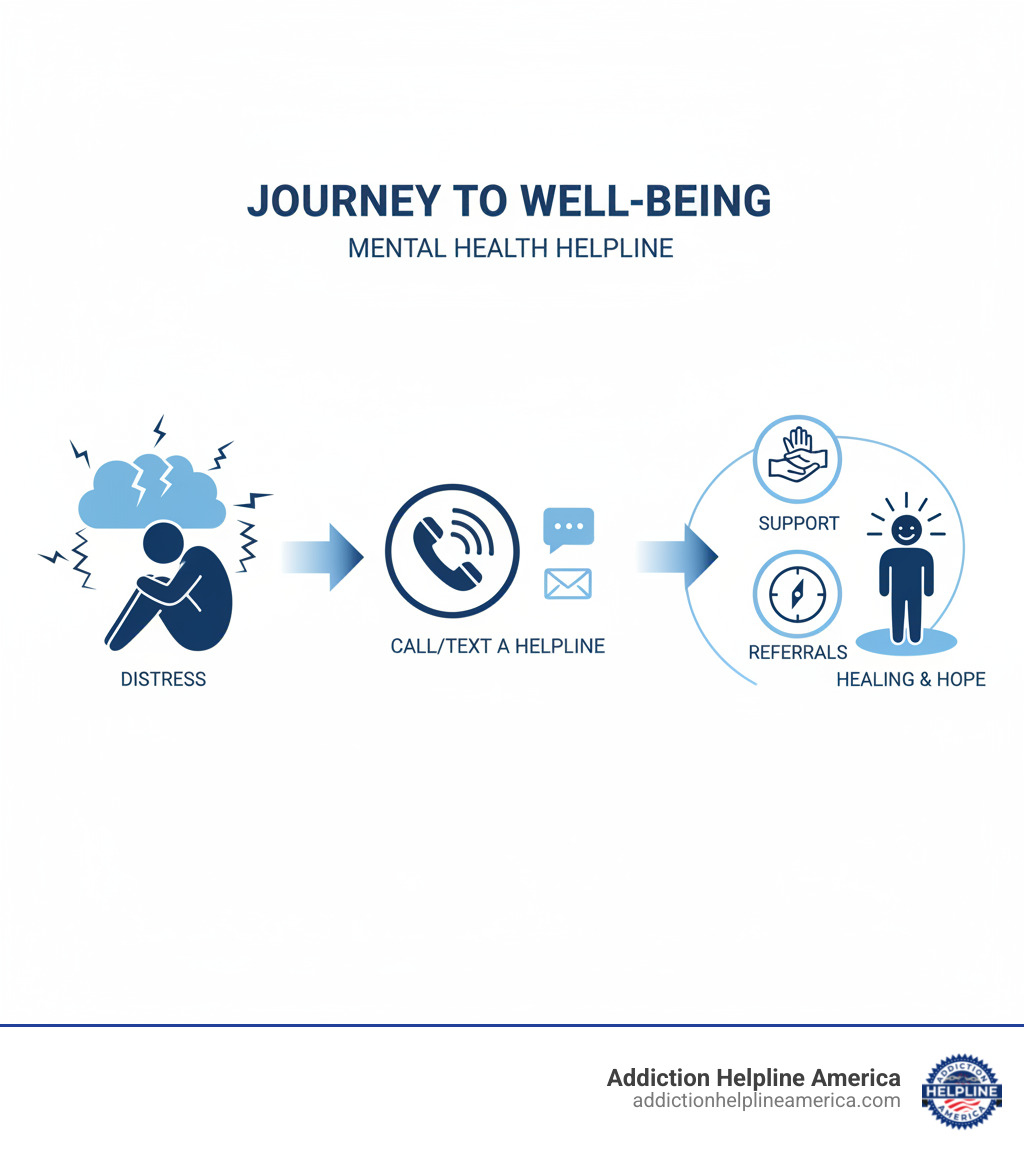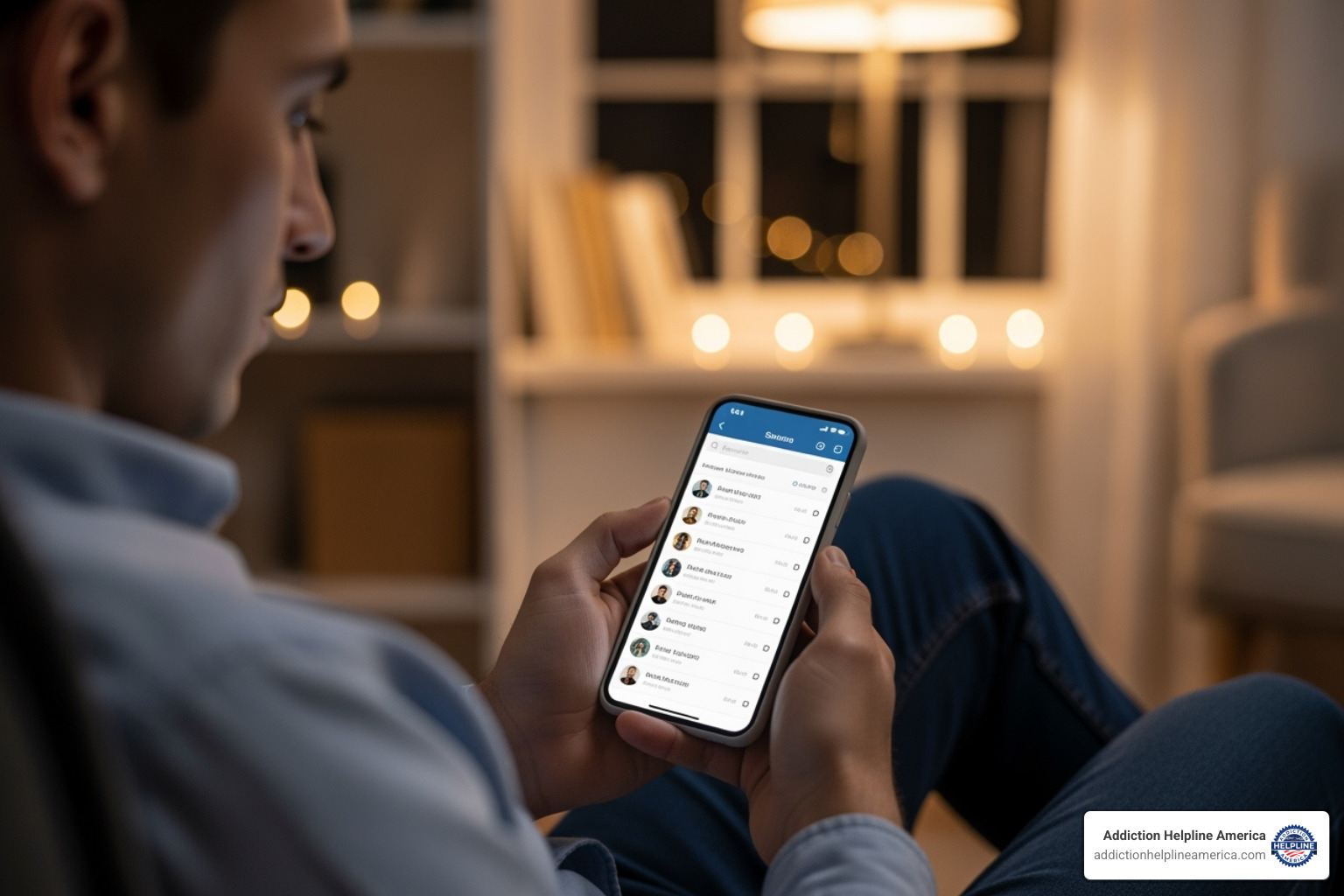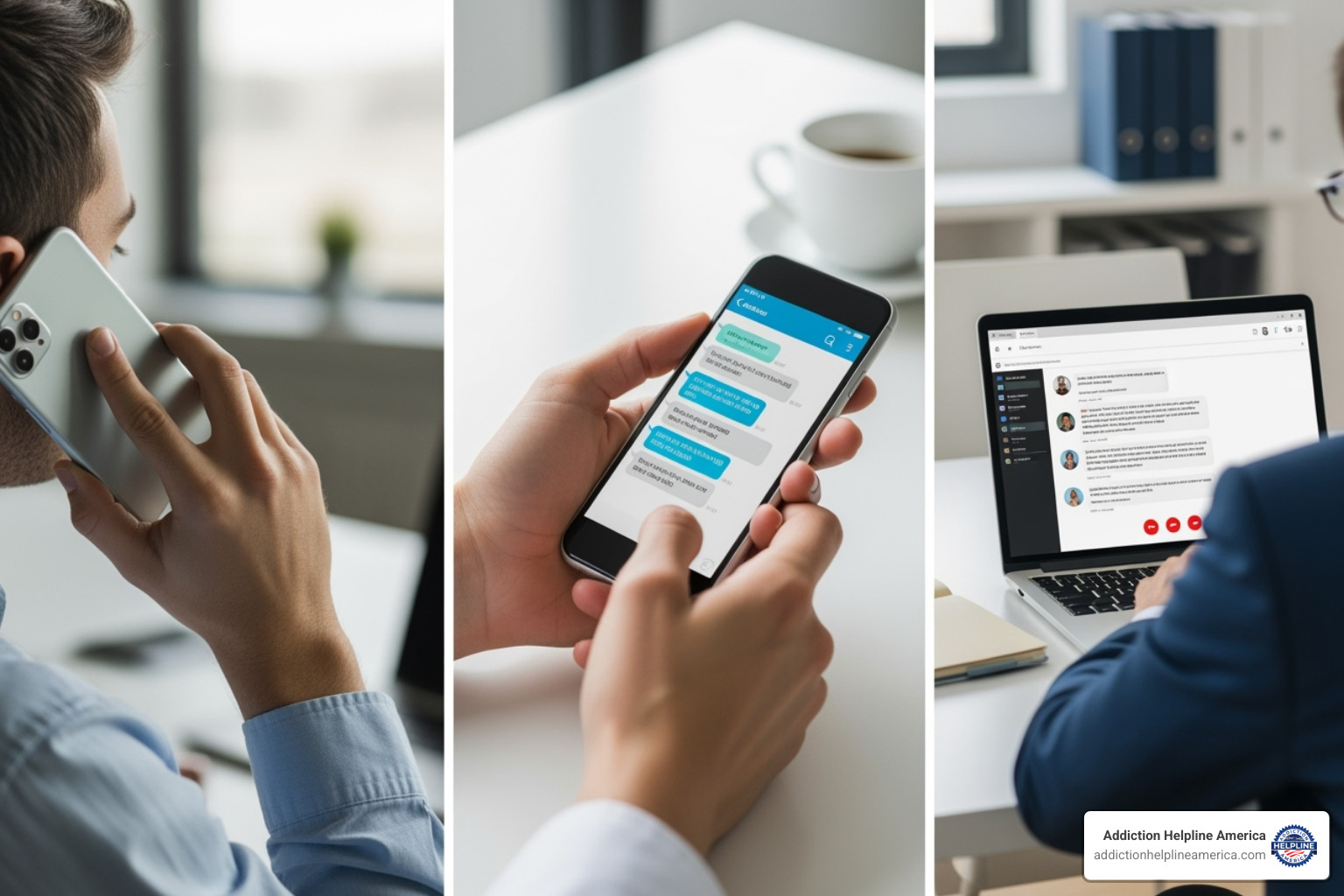
Why Finding the Right Mental Health Support Matters
When you or a loved one is struggling with mental health or addiction, knowing where to turn can feel overwhelming. The good news is that you’re not alone, and immediate help is available. A mental health helpline provides free, confidential support from trained counselors 24/7 via phone, text, or chat.
These services are a critical first step, connecting millions of people to support each year. They offer:
- Immediate emotional support and crisis intervention
- Information about mental health conditions
- Referrals to local treatment and resources
- A confidential, judgment-free space to talk
Key helplines include:
- 988 Suicide & Crisis Lifeline: For immediate crisis support (call or text 988).
- SAMHSA National Helpline: For mental health and substance use (1-800-662-4357).
- Veterans Crisis Line: For veterans and active military (call 988, then press 1).
- 211: Connects to local mental health and social services.
With so many options, how do you choose the right one? This guide will help you understand your needs and find the best fit.
At Addiction Helpline America, we help individuals and families steer the path to recovery by connecting them with the right mental health resources for their unique situation. Our team understands that finding help should be your first step toward healing, not another source of stress.
What is a Mental Health Helpline and What Can It Do for You?
A mental health helpline is a service you can reach by phone, text, or online chat for immediate support with mental health concerns. Think of it as a compassionate, trained listener available 24/7, with no appointments or waiting rooms.
These services are free and confidential, removing major barriers to getting help. You don’t need insurance or even have to give your name. The people who answer are trained responders, including counselors, social workers, and psychologists, who know how to provide emotional support, crisis intervention, and information about local services.
They offer a safe space to talk without judgment, help you develop coping strategies, and can provide referrals to services like therapists, treatment programs, or support groups in your area. The support is immediate, and taking that first step is often the hardest part.
However, it’s important to understand their limitations. Helplines are a vital bridge to care, but they are not a replacement for long-term therapy. Responders cannot diagnose conditions or prescribe treatment. For immediate physical danger or a medical emergency, always call 911 first.
The Types of Support You Can Expect
When you connect with a helpline, you’ll find a trained responder who offers:
- Active Listening: They provide a non-judgmental space where you can share your honest feelings without worry.
- Coping Strategies: They work with you to develop practical techniques to manage stress, anxiety, or difficult emotions in the moment.
- Crisis De-escalation: In moments of crisis, they use proven techniques to help restore a sense of calm and safety.
- Information and Referrals: They offer valuable information on mental health conditions and can connect you to local resources like therapists, treatment centers, and support groups.
If you’re looking for peer support, you can find a support group for mental health, drugs, alcohol through resources like ours at Addiction Helpline America.
The Benefits of Anonymity and Accessibility
One of the most powerful features of helplines is their accessibility:
- Available 24/7: Help is there whenever you need it, day or night, with no appointment needed.
- Confidential and Anonymous: Your conversations are private, and you can remain anonymous. This anonymity reduces stigma and makes it easier to be open and honest.
- Multiple Ways to Connect: Whether you’re at home or on the go, support is just a call, text, or chat away. This flexibility ensures you can reach out in the way that feels most comfortable for you.
How to Find the Right Mental Health Helpline in 5 Steps
When you’re struggling, finding the right help shouldn’t add to your stress. We’ve created five clear steps to help you cut through the noise and connect with support that truly fits your situation.
Think of this as your personal roadmap to matching your unique needs with the right kind of help. There’s no single “perfect” helpline for everyone; what matters is finding the best match for your needs, comfort level, and current situation. You’ve already taken the hardest step by deciding to reach out—now let’s make sure you connect with the right support.
1. Assess Your Need: Are You in Crisis or Seeking General Support?
First, take a moment to assess what you’re experiencing. This helps connect you with the right support at the right time.
Are you in a crisis?
A crisis involves immediate risk. If you are having suicidal thoughts, planning to harm yourself, or if you or someone else is in physical danger, you need urgent intervention.
- For immediate medical emergencies or danger, call 911 right away.
- For urgent mental health crises, call or text the 988 Suicide & Crisis Lifeline. Trained crisis counselors provide bilingual, trauma-informed support 24/7. They are equipped to de-escalate the situation and ensure you’re safe.
Are you seeking general support?
Maybe you’re not in crisis, but you’re feeling overwhelmed, anxious, or emotionally exhausted. These feelings are just as valid, and support is available. Many helplines offer compassionate listening for general emotional distress. They can help you process feelings, suggest coping strategies, and guide you toward ongoing resources.
The key difference is urgency. Crisis helplines are for immediate, life-threatening situations. General support helplines are for the building pressures and moments when you need a caring voice to find your footing.
If you’re unsure, call any mental health helpline. The trained responders can assess your situation and guide you to the right level of care. For a comprehensive directory, visit Addiction Helpline America – Mental Health & Crisis Support.
2. Explore Different Types of Helplines for Specific Needs
While general helplines are excellent, sometimes connecting with a specialized service provides a more personal level of understanding. These helplines are designed with specific experiences in mind.
Consider if one of these specialized helplines is a better fit for you:
- For Youth: Kids Help Phone in Canada (for ages 5-29) and Tel-jeunes in Quebec offer support custom to the pressures of growing up.
- For Veterans & Military: The Veterans Crisis Line (call 988 and press 1) provides support from responders who understand the challenges of service.
- For the LGBTQ+ Community: The LGBTQ+ National Hotline (1-888-843-4564) offers a safe, affirming space and connects you to local resources.
- For Substance Use: The SAMHSA National Helpline (1-800-662-4357) provides 24/7 information and referrals for both addiction and mental health concerns.
- For Indigenous Peoples: Canada’s Hope for Wellness Help Line (1-855-242-3310) offers culturally sensitive care, available in English, French, and by request in Cree, Ojibway, and Inuktitut.
- For Grief: MyGrief.ca and related sites offer online support custom to different ages and experiences of loss.
- For Maternal Mental Health: Postpartum Support International and the National Maternal Mental Health Hotline (1-833-TLC-MAMA) support new and expecting mothers.
- For Violence & Abuse: The National Domestic Violence Hotline (1-800-799-SAFE), National Child Abuse Hotline (1-800-4AChild), and National Sexual Assault Hotline (1-800-656-HOPE) provide critical, confidential support.
The right mental health helpline meets you where you are. For a comprehensive guide, visit Addiction Helpline America – Specialized Hotlines.
3. Choose Your Communication Style: Phone, Text, or Online Chat
Modern mental health helpline services let you choose how to connect, so you can use the method that feels most comfortable for you.
-
Phone Calls: Hearing a compassionate human voice can be powerful. It allows for a real-time, personal conversation where a responder can pick up on vocal nuances. Most helplines offer toll-free numbers, so the call is always free.
-
Text-Based Support: Texting is a great option if you need discretion or find it easier to write out your thoughts. You can reach out from anywhere, anytime, without needing a private space to talk. The Crisis Text Line (text HOME to 741741) is a popular example.
-
Online Chat: Chat services, often found on helpline websites like 988lifeline.org, offer a middle ground. You get the real-time, interactive feel of a conversation while communicating through writing.
There’s no wrong choice. Phone calls offer immediate emotional connection, texting provides maximum privacy, and chat combines real-time interaction with written communication. Think about what feels easiest for you to open up, and choose that path.
4. Understand What to Expect From a Mental Health Helpline Call
Reaching out can be intimidating if you don’t know what to expect. Here’s a simple breakdown of what happens when you connect with a mental health helpline.
You’ll be connected to a trained responder—a skilled professional or volunteer—who is there to support you without judgment. Wait times can vary, but crisis lines like 988 work to connect you as quickly as possible.
Once connected, the conversation is yours to control. You decide what to share. The responder may ask questions like “How are you feeling?” or “Are you safe?” to understand your situation and how best to help. Their goal is to listen and support you, not to criticize.
It’s completely okay to not know what to say. Simply saying “I’m struggling” is enough to start the conversation. The responder will gently guide you.
The goal of the call is not to provide a diagnosis or medical treatment. Instead, the responder offers immediate emotional support, helps you explore coping strategies, and can connect you with resources for ongoing care if you need them. It’s a safe space to be heard and find a way forward.
5. Confirm Key Details: Cost, Confidentiality, and Eligibility
Before you reach out, it’s helpful to understand a few practical details. Here’s what you need to know:
-
Cost: Reputable mental health helplines are completely free. They are funded by governments and public donations, so you will never receive a bill. There are no fees or insurance requirements.
-
Confidentiality: Your conversation is confidential. What you share stays between you and the responder, creating a safe space to talk openly. The only exception is in rare cases of imminent risk of serious harm to yourself or others, or in cases of reported child or elder abuse. In these situations, responders are legally required to intervene to ensure safety.
-
Eligibility: Many national helplines, like 988, are available to everyone. However, some specialized lines have criteria based on age (e.g., Kids Help Phone for youth in Canada) or location (e.g., provincial helplines). It’s always worth a quick check, but if one line isn’t the right fit, another one will be.
Frequently Asked Questions About Using a Mental Health Helpline
It’s normal to have questions before reaching out. Here are honest answers to some common concerns to help you feel more confident.
Are conversations with a helpline truly confidential and anonymous?
Yes. Confidentiality is the foundation of these services. Most helplines allow you to remain completely anonymous. Your conversation is private, creating a safe space to be honest. The only exception is if a responder believes you or someone else is in immediate, serious danger, or if they learn of child or elder abuse. In these rare cases, they are legally required to report it to ensure safety, and they will typically inform you of this step.
What kind of training do helpline responders have?
Responders are not just well-meaning people; they have real expertise. Many helplines are staffed by multidisciplinary teams of nurses, social workers, and psychologists. Others use highly trained volunteers who complete extensive preparation. This training covers crisis intervention, active listening, empathy, and how to connect callers with the right local resources. Many also receive specialized training to support specific communities, such as veterans or LGBTQ+ youth.
What is the role of a helpline within the larger mental healthcare system?
Helplines are an essential part of the healthcare system. They act as a crucial first point of contact and a safety net, available 24/7 when other services are closed. By providing immediate crisis support, they reduce the strain on emergency rooms. Most importantly, they serve as a bridge to formal care. A responder can help you stabilize in a difficult moment and then guide you toward long-term support like therapy or treatment programs. They don’t replace therapy—they help you find your way there.
At Addiction Helpline America, we see ourselves as part of this bridge, connecting you to the right treatment program when you’re ready for the next step.
Conclusion: Take the Next Step and Support the Cause
You now have a roadmap to finding the right mental health helpline for you or a loved one. You’ve learned how to assess your needs, explore specialized options, choose a communication style, and what to expect when you connect.
Reaching out isn’t giving up. It’s choosing to fight for yourself. It’s a courageous step toward recognizing you deserve support. You don’t have to face this alone.
At Addiction Helpline America, we are dedicated to empowering people to take that step. We connect individuals with the treatment centers and resources that can make a real difference in their recovery. If you’re ready for that next step, we’re here to provide personalized guidance.
If you’re in a place of stability, consider supporting these vital services. You can donate to helpline organizations, volunteer, or simply spread awareness. Your support ensures that a compassionate voice is always there to answer the call.
To explore our network of addiction and rehab hotlines and receive guidance custom to your needs, please visit Find the right addiction and rehab hotline for you. Your journey to well-being can start today.
Our helpline is 100%
free & confidential
If you or someone you care about is struggling with drug or alcohol addiction, we can help you explore your recovery options. Don’t face this challenge alone—seek support from us.
Programs
Resources
Will my insurance
cover addiction
treatment?
We're ready to help
Find the best
drug or alcohol treatment
center
Are you or a loved one struggling with addiction? Call today to speak to a treatment expert.

















